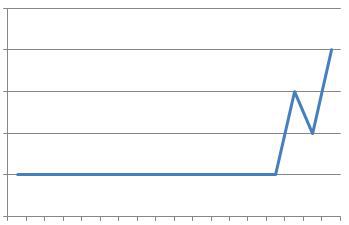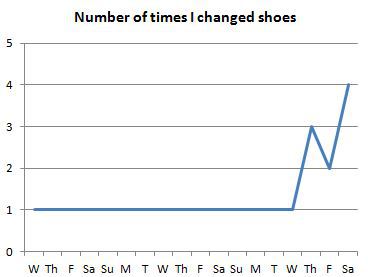I want to talk today about some of the really important pieces of information that circulated this weekend. First, I am certain that everyone is familiar with the following chart, which made the rounds after the Brexit vote. It shows an enormous surge in the search term “What is the EU” after the Brexit vote was completed:

This chart, or something very much like it, was all over the place. Oh, wait! I just realized that I forgot to put the axes on the chart!
Here it is with a few more relevant pieces of information – incidentally the same information that was left off the original chart. It turns out that it wasn’t the chart I thought it was. Sorry about that…they looked the same.

(For the record, after an extended period of indolence, on Thursday I went for a run; on Friday I went for a run before putting on any other shoes first; on Saturday I went for a run and then later put on different shoes to go to a cocktail party.)
Is it too much to ask that people seeking to insult the British voters at least put some effort into their attempt? Ignore for a moment the simple fact that we don’t know who was searching this – it might well have been the people who voted to Remain, after all – and so the story line that the people who voted Leave were just morons gets no support from this chart.
It also turns out that this was the second-most-searched term only for one small time segment: early in the morning after the vote. By 5am it was eclipsed by questions about the weather. Oh my – it seems the Britons also don’t know what weather is! Also, as the Telegraph’s skeptical story (linked above) points out, the raw number of people asking the question was only on the order of 1,000 – it was just a massive increase since it hadn’t been previously asked very much. This is where not having axes matters…it turns out this is a non-story, and nonsense.
Another piece of nonsense I want to point out is more general. I have seen several Twitter polls and other polls in something like this form:
Q: What effect do you think that Brexit will have on the global economy?
a) Deeply contractionary
b) Moderately contractionary
c) Somewhat contractionary
d) Expansionary
Now this is nonsense because the actual result not only has nothing to do with opinion, it’s not even clear why we would care about people’s opinion in this case (unless we are trying to show how pervasive the negative news stories are, or something). Polls work comparatively well when there is not a lot of information inequality – for example, when each person is asked about his or her own vote. But the poll above is analogous to this poll:
I submit that only me, and my valet, have the information sought by this poll; all other respondents have zero information. Therefore…what’s the value of the poll? Unless I or my valet are respondents, precisely zero; if we are, then the value is inverse to the number of other respondents diluting the response of the people who know.
Similarly, there is likely some information asymmetry among respondents to the poll about the effect of Brexit on the global economy. I would respectfully suggest that most people who are responding are saying what they have heard, or what they fear, or what they hope, while some people – macroeconomists, for example – might have actual models. To be sure, those models are probably only slightly better than the fearful and hopeful assumptions put into them, but the point is that this poll is nonsense in the same way that polling people about what they expect inflation next year to be is nonsense. The vast majority of respondents have no way to evaluate the question in a structured way, so what you are capturing is no more and no less than what people are worried about, which is itself just a reflection of what they’re seeing and hearing…for example, on Twitter.
(For what it’s worth, I think that thanks to the weakening of sterling Brexit is likely to be mildly stimulative to the UK economy, as well as somewhat inflationary, and slightly contractionary and disinflationary to the rest of the world. But the question about global effects is a trick question. Obviously, global production and consumption are unlikely to change much in real terms just due to the arrangement of trade flows. More friction in the system to the extent that Europe puts up significant trade barriers against the UK – something I don’t view as terribly likely – will lower global output slightly and raise global prices.)
These flash polls and Google) trends data are part and parcel of the Twitterization of discourse. They have in common the fact that they can be snapshot and draw eyeballs and clicks, whether or not there is any content to the observations. In these cases, and in many others, there isn’t.
Here’s a thought: why don’t we wait a few months, or better yet a few years, before we judge the impact of Brexit? Sometimes, having actual data is even better than a Twitter poll.
Editor's Note: Michael Ashton’s new book What’s Wrong With Money? The Biggest Bubble of All has been published by Wiley and is available from booksellers in hardback and e-book formats. You can also find it here. The book concerns the functions and weaknesses of money, the likely trajectory for inflation, and how investors can invest in an ‘inflation-aware’ way.
